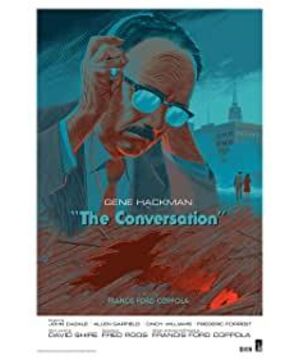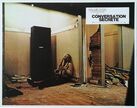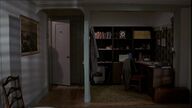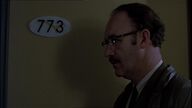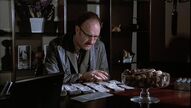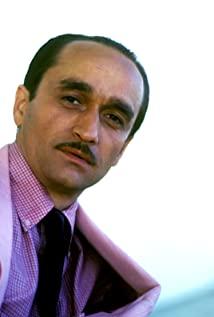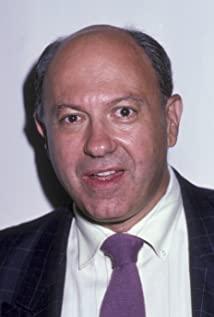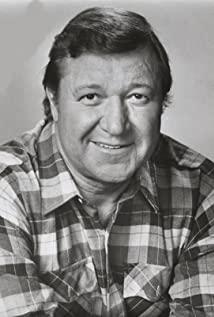The beginning of the film is a long-range overhead shot of a square. The chaotic sounds and dense crowds make people inaccessible (or can't find the main points). I really like this opening. Different from the straightforward opening of Hollywood's general assembly line works, this kind of opening seems to be unremarkable, but there is a faint power within that slowly drags the audience into the mood of the movie. Gradually, some mid-to-close shots appeared, and the audience gradually understood what was happening: an eavesdropping expert was tapping a bunch of young men and women wandering around in the square. Just when the audience was complacent, thinking that the narrative of the story was about to unfold, they found that the conversation between men and women was inexplicable. Unknown, unknowingly, the story entered that of a mediocre middle-aged man. Be cautious and uninteresting in life.
The progress of the story has been very slow, the dialogue between young men and women is still inexplicable, the repeated debugging of the male protagonist is almost annoying, and the mistress passage that has nothing to do with the main story may even make many viewers who like compact narratives have After the urge to exit, until the end, he only singled out the words "They will kill us if they have a chance", adding a hint of suspense to the already inexplicable audience.
After experiencing all this disturbing the audience, the actor finally took the inexplicable tape to the employer's company. From the conversation and confrontation between the protagonist and the secretary of the chairman, the story finally progressed vaguely. The relationship between men and women seemed to offend the powerful chairman. The male protagonist vaguely felt that there was something hidden, so he didn't hand the tape to the secretary. , Insisted to give it to the chairman in person. When leaving the company building, the male protagonist found that both men and women were employees of the company...
and then there was another eavesdropping exhibition that seemed to have nothing to do with the plot. The fierce secretary followed, and the carnival with friends and rivals happened. Conflict, going to bed, weird dreams. At this time, the audience's mood almost reached an uneasy and inexplicable extreme, just like the middle-aged man on the screen.
Wake up from the dream, the belt is missing.
The anxious male protagonist, like the audience, rushed to the chairman's office, and in the office there was a tape he carefully recorded and sorted out. The chairman, who had not shown up, finally showed up, but after a few words, the chairman impatiently sent the leading actor to leave. Before leaving, the male protagonist looked around and saw some photos. It was then that he realized that the woman who was tapped was the wife of the chairman.
Anxious, he went to the hotel mentioned in the conversation between men and women to find out. Unexpectedly, not only did he fail to eavesdrop, he also witnessed through the ground glass a woman was killed by a murderer and stained the screen with blood. After anxiously and boringly through the day, the male protagonist finally mustered up the courage to sneak into the room where the incident occurred with his own professional skills. The scene has been processed, clean, as if no one had lived. Until the male lead pressed the flush button while checking the toilet, a stream of blood spurted out.
The next day, the male protagonist went to the company anxiously, saw a person in the car on the side of the road, and discovered the truth of the matter.
Back home, I received a mysterious phone call and learned that I was being monitored. With his professional knowledge, the protagonist searched every part of the house, but found no monitoring equipment. Until he demolished most of his home, he chose to compromise and played the saxophone alone in the corner.
It’s no accident that this film was nominated for the Oscar for Best Picture, and Coppola has once again proved his ability with this film. The success of "The Godfather" is by no means a film school graduate hitting his luck, but ability. The embodiment. From the very beginning, Coppola tried his best to pull the audience's emotions into the movie. The noisy voices, the observation perspective based on the mid-to-long-distance lens, the conversation with the lover, the conflict with the competitor, and the one-night stand of the woman. These details seem to have nothing to do with the plot, but they all imperceptibly bring the audience into a boring mediocrity. In the life of the middle-aged eavesdropper, isn’t this life the life of everyone living in this indifferent society? There is no sense of trust, anxiety, and loneliness. The protagonist's eavesdropping expert status and suspenseful stories only serve as an amplifier, magnifying everyone's life on the screen in a dramatic way. The suspenseful story gradually looms in the whole film's progress, which promotes the emotional development of the audience, and also brings people to the extreme of emotional catharsis at the last moment. If this story were handed over to the hands of a mediocre Hollywood director, it might be a third-rate suspense film with a mystery. In Coppola's hands, storytelling is no longer the center of the movie, but a catalyst for emotions. What he really wants to show is not a strange and suspenseful story, but a reflection of the loneliness, indifference, mediocrity and boredom of everyone trapped in contemporary society. He used a subtle but forbearing but not lacking in power. A hard punch in the mind of each audience made them think.
View more about The Conversation reviews


